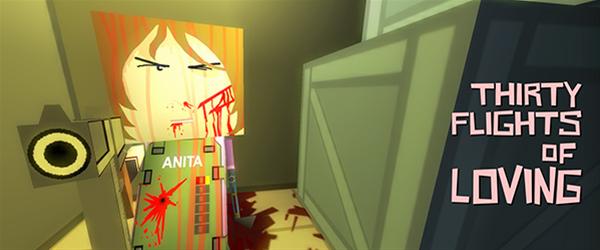A Cryptic Heist
By gamer_152 3 Comments

Thirty Flights of Loving is certainly an unusual beast. Under other circumstances I’d tell you that if you haven’t played a game like this, you should stop reading right now and go experience it for yourself, but I’m not sure you can just go and tell anyone interested in video games that it will be worth it for them to spend £3.99 on something that can be easily completed in under 15 minutes. I find it hard to gauge how much Thirty Flights is worth, I’m not sure actually playing through it is a positive experience, I’m not even entirely sure what happens in it, and yet I still like what it does.

With its random and sudden jump-cuts, non-linear narrative, out-of-context scenes, and commitment not to use any dialogue or GUI elements to tell its story, the game is inevitably very confusing, and is undoubtedly meant to be. I feel like it’s the kind of game that despite doing some important things, would sadly never make it past regular QA testing, because it feels that it’s less about the experience you have playing it in the moment, and more about what you gain from reflecting, analysing, and speculating on it afterwards.
While many stories in games may fall apart the more you think about them, Thirty Flights seems built largely for the exact purpose of you picking it apart, and so like with any piece of art or entertainment that requires you to really think about it to fully enjoy it, it seems a necessity to go away and digest the game before you can say you’ve really experienced it. I should probably point out that I use terms like “game” and “playing” loosely, as Thirty Flights is stuck in that same weird space as something like The Stanley Parable (which I would encourage everyone interested in stories in games to play), where it’s not a game, but there’s not really a phrase for what it is beyond something very awful-sounding like “Interactive narrative-based software”.
In many ways it feels like Thirty Flights has less investment in entertaining you, and more in providing a lesson or thought exercise based around storytelling in games. For one thing it shows us how games can benefit from telling parts of their stories through environments and events rather than dialogue. I feel many games don’t take this idea as far as it could be taken, and their storytelling suffers for it. It also shows that sometimes you can say more by saying less. The game rarely spells things out, instead making its own story a kind of puzzle where the player has to pay attention and really analyse what’s occurred to work out what just happened, or fill in the gaps in the story with their own imagination.

The more something asks for work on the part of its audience for them to enjoy it, the fewer people it becomes accessible to, but it can become all the more enjoyable for those who are willing to put in that work. Asking the audience to figure out large parts of the story for themselves has a number of benefits; as the game commentary notes, you get a sense of satisfaction from solving these little puzzles, and it feels good to know that a game respects your intelligence enough to trust you with solving them. On top of that though, it also lets you become the storyteller to some degree; when you apply your own meaning to the story, and when you fill in the gaps in your own way, you end up creating a unique experience for yourself, and a version of the events that feels very personal to you. This also makes it only more interesting to swap stories of the game with others.
The kind of ambiguous tale that Thirty Flights tells overall isn’t necessarily better than the types of stories you can find in other games, but by the way it isolates a few storytelling concepts and plays them out in a sort of sandbox case, it highlights the value of these concepts and shows what they can bring to a game. For me, it also raises the question that if games are meant to be so focused around the player working for their reward, why don’t more games apply this philosophy to their narratives?